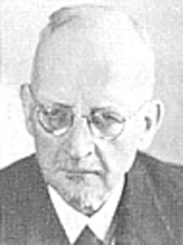
ゲルハルト・キッテル
Gerhard
Kittel, 1888-1948

ゲルハルト・キッテル(Gerhard Kittel、1888年9月23日 - 1948年7月11日)は、ドイツのルター派[1]の神学者、聖書言語学の辞書編纂者である。聖書学の分野では『新約聖書神学辞典』 (Theologisches Wörterbuch zum Neuen Testament)が有名である[6]。旧約聖書学者ルドルフ・キッテルの 息子であり[8]、1914年にハン ナ・ウンターマイヤーと結婚したが、子供はいなかった[引用] 1933年5月にナチ党に入党した[7]。それ以前は政治に関わることはなかったが、同党を「キリスト教と道徳を基盤とするヴェルキッシュ刷新の運動」だ と呼んだ[9][引用] 。
| Gerhard Kittel (23
September 1888 – 11 July 1948) was a German Lutheran[1] theologian and
lexicographer of biblical languages. He was an enthusiastic supporter
of the Nazis[5] and an open antisemite.[6] He is known in the field of
biblical studies for his Theologisches Wörterbuch zum Neuen Testament
(Theological Dictionary of the New Testament).[7] |
ゲルハルト・キッテル(Gerhard
Kittel、1888年9月23日 -
1948年7月11日)は、ドイツのルター派[1]の神学者、聖書言語学の辞書編纂者である。聖書学の分野では『新約聖書神学辞典』
(Theologisches Wörterbuch zum Neuen Testament)が有名である[6]。 |
| Kittel was born on 23 September
1888 in Breslau.[citation needed] The son of Old Testament scholar
Rudolf Kittel,[8] he married Hanna Untermeier in 1914, but there were
no children from the union.[citation needed] In May 1933, he joined the
Nazi Party.[7] He had had no previous involvement in politics but
called the party "a völkisch renewal movement on a Christian, moral
foundation".[9] On 3 May 1945, after Adolf Hitler's Third Reich capitulated to the Allies, Kittel was arrested by the French occupying forces.[7] He was subsequently removed from office and interned at Balingen.[10] In his own defence, Kittel maintained his work was "scientific in method" and motivated by Christianity, although it may have appeared antisemitic to some.[11] He attempted to distinguish his work from the "vulgar antisemitism of Nazi propaganda" like Der Stürmer and Alfred Rosenberg,[11] who was known for his anti-Christian rhetoric, völkisch arguments and emphasis on Lebensraum.[12] Kittel characterized his work as an "attempt to grapple with the problem of Jewry and the Jewish question".[11] Martin Dibelius, a theologian at Heidelberg, wrote that Kittel's works related to ancient Judaism "are of purely scientific character" and "do not serve the Party interpretation of Judaism".[13] He said further that Kittel deserved "the thanks of all who are interested in the scientific study of Judaism."[14] |
旧約聖書学者ルドルフ・キッテルの息子であり[8]、1914年にハン
ナ・ウンターマイヤーと結婚したが、子供はいなかった[引用]
1933年5月にナチ党に入党した[7]。それ以前は政治に関わることはなかったが、同党を「キリスト教と道徳を基盤とするヴェルキッシュ刷新の運動」だ
と呼んだ[9][引用] 。 1945年5月3日、アドルフ・ヒトラーの第三帝国が連合国に降伏した後、キッテルはフランス占領軍に逮捕された[7]。 その後、彼は職を追われ、バリンゲンに抑留された[10] 自身の弁護として、キッテルは彼の仕事が「科学的な方法」でありキリスト教によって動機づけられているとしたが、一部の者には反ユダヤ的に見えたかもしれ ない[11]。 [彼は自分の仕事を、反キリスト教的なレトリック、ヴェルキッシュ的な議論、レーベンスラウムの強調で知られていたデア・シュトゥルマーやアルフレッド・ ローゼンベルクといった「ナチのプロパガンダの下品な反ユダヤ主義」と区別しようとした[11]。 キッテルは自分の仕事を「ユダヤとユダヤ人問題への取り組み」であると位置付けていた[11]。 ハイデルベルクの神学者であるマルティン・ディベリウスは、古代ユダヤ教に関連するキッテルの著作は「純粋に科学的な性格を持っており」、「ユダヤ教の党 の解釈に役立たない」と書いている[13]。 さらに彼はキッテルが「ユダヤ教の科学的研究に興味を持つすべての人々の感謝に値する」と述べている[14]。 |
| Claus Schedl, who attended
Kittel's lectures on the Jewish Question in the winter of 1941–1942 in
Vienna, said that "one heard not a single word of malice" and that
"Professor Kittel truly did not collaborate".[14] Schedl says that
Kittel was one of very few scholars who promoted an opinion on the
Jewish Question other than the official one.[14] Kittel himself said
his goal was to combat the myths and distortions of extremist members
of the Nazi Party.[11] Annemarie Tugendhat was a Christian Jew whose father had been taken to the concentration camp Welzheim in 1938.[14] She testified that Kittel had strongly objected against the actions being taken against Jews. Kittel's work on the Jewish Question was not based on the racial theories of Nazism but upon theology.[15][page needed] In 1946, Kittel was released pending his trial, but was forbidden to enter Tübingen until 1948. From 1946 to 1948 he was a pastor (Seelsorger) in Beuron. In 1948, he was allowed back into Tübingen, but died that year before the criminal proceedings against him could be resumed.[15][page needed] He died on 11 July 1948.[16] |
1941年から1942年の冬にウィーンで行われたキッテルのユダヤ人
問題に関する講義に参加したクラウス・シェドルは、「悪意は一言も聞こえなかった」、「キッテル教授は本当に協力しなかった」と述べている[14]。
シェドルは、キッテルがユダヤ人問題に関して公式以外の意見を促進した非常に数少ない学者の一人だったと述べている。
キッテル自身も、彼の目的はナチの過激派のメンバーの神話と歪曲に立ち向かうためであると述べている[11]。 アンネマリー・トゥーゲントハットはキリスト教徒の改宗ユダヤ人で、父親は1938年にウェルツハイム強制収容所に連行された。 彼女はキッテルがユダヤ人に対する行為に強く反対していたことを証言している[14]。キッテルのユダヤ人問題に関する研究は、ナチズムの人種論ではな く、神学に基づいていた[15][要ページ]。 1946年、キッテルは裁判を待たずに釈放されたが、1948年までテュービンゲンへの入国を禁じられた。1946年から1948年まで彼はボーロンで牧 師(Seelsorger)であった。1948年、彼はテュービンゲンに戻ることを許されたが、彼に対する刑事訴訟が再開される前にその年に死亡した [15][要ページ]。 1948年7月11日に死亡した[16]。 |
| Nazi Germany A Professor of Evangelical Theology and New Testament at the University of Tübingen, he published studies depicting the Jewish people as the historical enemy of Germany, Christianity, and European culture in general. In a lecture of June 1933 Die Judenfrage (The Jewish Question), that soon appeared in print, he spoke for the stripping of citizenship from German Jews, their removal from medicine, law, teaching, and journalism, and to forbid marriage or sexual relations with non-Jews – thus anticipating by two years the Nazi government, which introduced its Nuremberg Racial Laws and took away Jewish rights of German citizenship in 1935.[17] A close friend of Walter Frank,[citation needed] Kittel joined Frank's Reichsinstitut für Geschichte des neuen Deutschlands, a politicized organization that claimed to be involved in scholarship,[citation needed] upon its foundation[7] in 1935. Within this institute[citation needed] he was attached to the highly antisemitic[citation needed] Forschungsabteilung judenfrage.[7] William F. Albright wrote that, "In view of the terrible viciousness of his attacks on Judaism and the Jews, which continues at least until 1943, Gerhard Kittel must bear the guilt of having contributed more, perhaps, than any other Christian theologian to the mass murder of Jews by Nazis."[18][page needed] |
ナチス・ドイツ テュービンゲン大学の福音主義神学と新約聖書の教授で、ユダヤ人をドイツ、キリスト教、ヨーロッパ文化全般の歴史的敵として描く研究を発表した。1933 年6月の講演『ユダヤ人問題』(Die Judenfrage)で、 彼はドイツのユダヤ人から市民権を剥奪し、医学、法律、教育、ジャーナリズムから排除し、非ユダヤ人との結婚や性的関係を禁止するよう訴え、1935年に ニュルンベルク人種法を導入してユダヤ人のドイツ市民権を奪ったナチス政府を2年先取りしている[17]。 [キッテルはヴァルター・フランクの親友であり[citation needed]、1935年に設立されたフランクの帝国史研究所(学問に携わることを主張する政治的な組織)に参加した[citation needed][7]。この研究所[citation needed]の中で、彼は非常に反ユダヤ的な[citation needed]Forschungsabteilung judenfrageに所属していた[7]。 ウィリアム・F・オルブライトは「少なくとも1943年まで続くユダヤ教とユダヤ人に対する彼の攻撃の恐ろしい悪意から見て、ゲルハルト・キッテルは、お そらく他のどのキリスト教神学者よりもナチスによるユダヤ人の大量殺戮に貢献したという罪を負わなければならない」18][要頁]と書いている。 |
| Die Oden Salomos überarbeitet
oder einheitlich, 1914 Jesus und die Rabbinen, 1914 Die Probleme des palästinensischen Spätjudentums und das Urchristentum, 1926 Urchristentum, Spätjudentum, Hellenismus, 1926 Die Religionsgeschichte und das Urchristentum, 1932 Founder and co-editor of the Theologisches Wörterbuch zum Neuen Testament, 5 vols., 1933–1979 Ein theologischer Briefwechsel mit Karl Barth (A theological correspondence with Karl Barth, 1934 with Karl Barth Christus und Imperator, 1939 Das Antike Weltjudentum – Forschungen zur Judenfrage (World Jewry of Antiquity – Research on the Jewish Question), 1943 with Eugen Fischer |
|
| https://en.wikipedia.org/wiki/Gerhard_Kittel |
https://www.deepl.com/ja/translator |
+++
Links
リンク
文献
その他の情報



++
Copyleft,
CC, Mitzub'ixi Quq Chi'j, 1996-2099